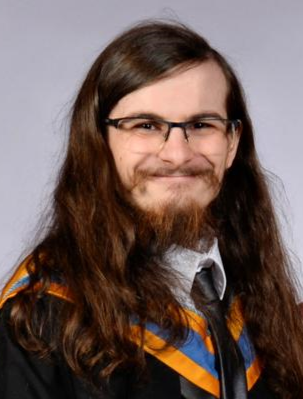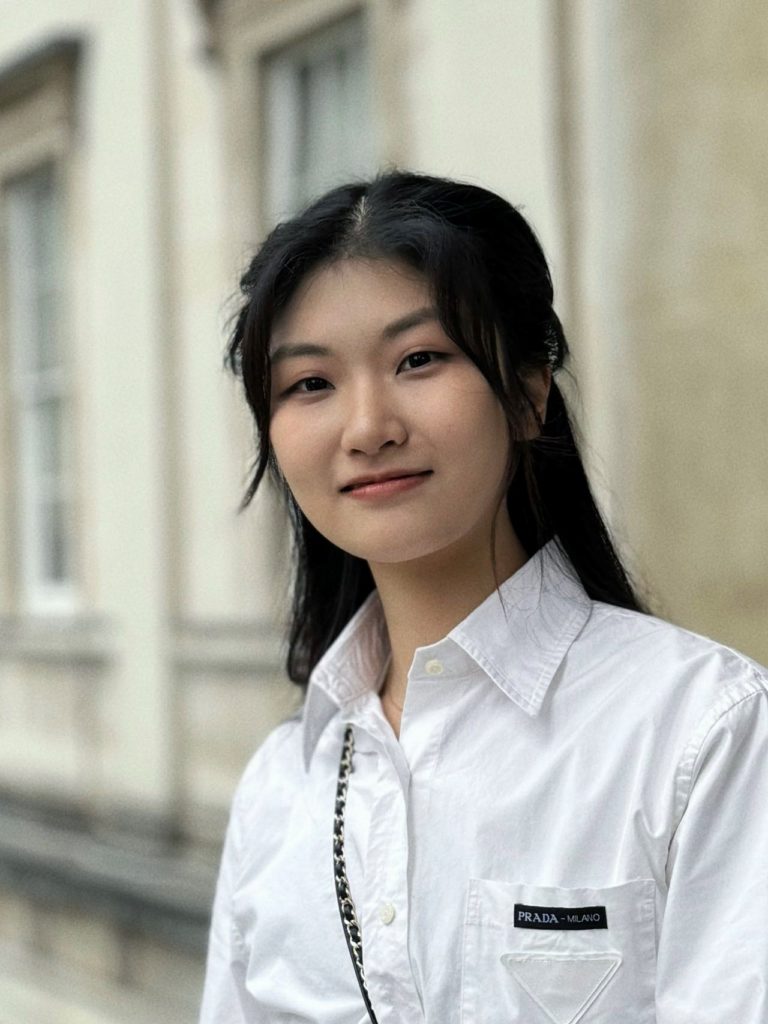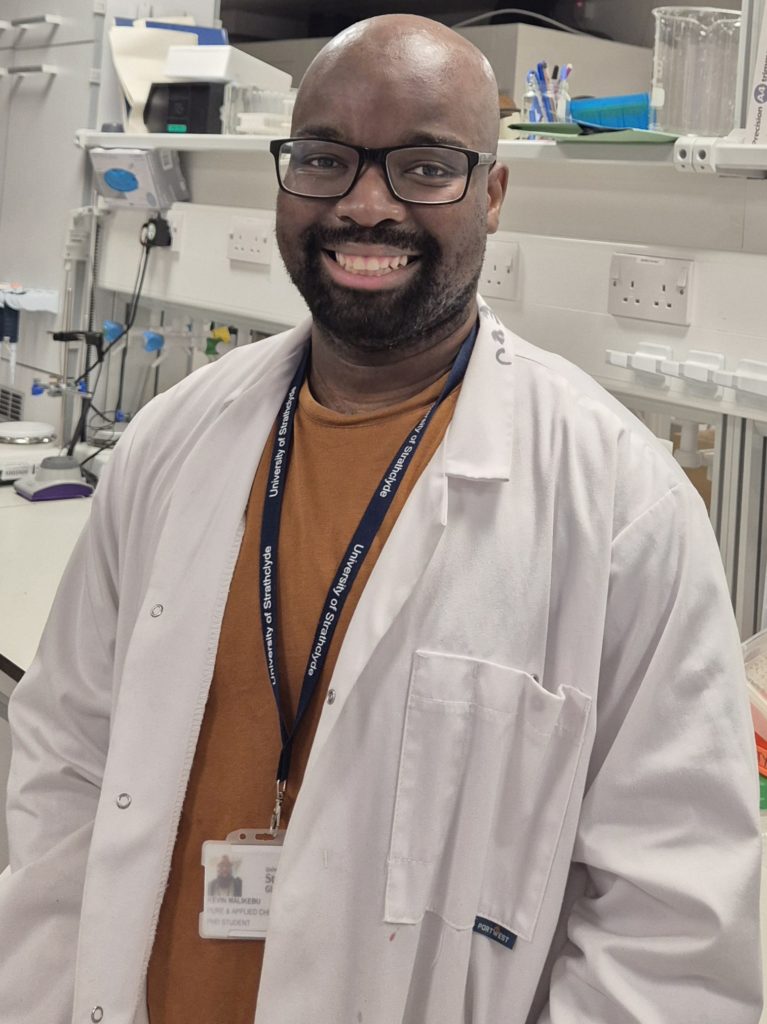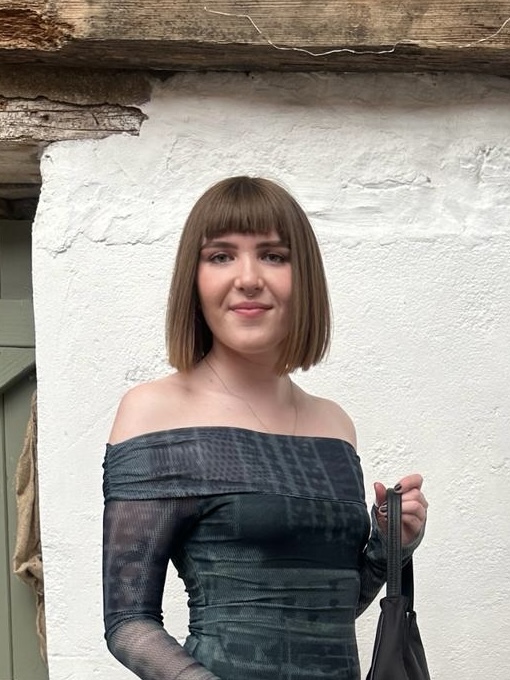
Ryan Fraser is a PhD student in computational chemistry specialising in nature-inspired chemistry. His work focuses on leveraging advanced algorithms and machine learning to accelerate the discovery of bio-inspired chemical solutions through molecular simulations. By combining computational modeling with artificial intelligence, he will guide the development of innovative systems with an interdisciplinary approach that bridges chemistry, biology, and AI.
Ryan’s research explores nature-inspired acoustics, drawing from the intricate hearing mechanisms of insects to design acoustically responsive materials and synthetic compounds. Through machine learning, he streamlines the identification and optimisation of bio-inspired chemicals for applications such as synthetic antibiotics and advanced functional materials. His aim is to reduce computational demands while advancing discovery in this dynamic and emerging field.
Shannon Keenan holds a BSc in Zoology and an MRes in Ecology and Environmental Biology from the University of Glasgow. Her research has focused on the ecological impacts of urbanisation on vector species, integrating behavioural, physiological, and ecological insights to address novel questions and uncover hidden patterns. She has developed innovative bespoke tools, including a 3D-printed light choice chamber and enhanced trapping systems for aquatic organisms, designed to align with the unique ecology of target species. Her dedication to merging biology with technological innovation earned her the Sutherland Trust Scholarship, enabling her to acquire a 3D printer and modelling software to advance her research and skills. Shannon combines advanced statistical modelling, R programming, and interdisciplinary techniques to explore complex ecological systems and uncover new insights.
Shannon’s current research explores the mechanics of insect auditory systems and their influence on communication strategies. She will aim to investigate the molecular and mechanical compositions that drive these exceptional sensory systems in insects and arachnids, hoping to understand how communication and physiological responses adapt to anthropogenic activities, structures, and noise pollution. Communication and sensory capabilities are key in all organisms, underpinning their survival and success. By studying how these systems function in stressful and non-traditional environments, Shannon seeks to advance our understanding of sensory ecology and the resilience of communication mechanisms in a rapidly changing world.


Xinyu Jiang is a PhD student in Management Science at Strathclyde Business School. Xinyu holds an Msci Psychology degree from University College London (UCL), where she developed a strong interest in human cognition and learning. Beyond academic research, she has actively sought to translate behavioural insights into practical applications, including leading the ‘Reducing Energy Consumption at the PALS building’ project in 2024. Also, she was honoured as the winner of the UCL x LSE Nudgeathon 2024, a competition focused on applying behavioural science to real-world challenges.
Xinyu’s PhD research investigates expert optimism in technology foresight Delphi surveys. Specifically, her work examines whether this optimism is an artefact of the design and application of the Delphi method. By deepening understanding of these dynamics, Xinyu aims to refine decision-making tools like Delphi to enhance the quality and reliability of our collective foresight–hoping that she is not being overly optimistic herself.
Sara Luoni is a PhD student in the Architecture Department at the University of Strathclyde, where she also completed both her Bachelor’s and Master’s degrees. Sara’s work has always focused on inclusivity in design and its impact on mental health and stress reduction. For her undergraduate thesis, she focused on how biophilic design elements can make every day spaces like schools, offices, hospitals, and malls more inclusive for neurodivergent individuals. For her Master’s research, she explored how city wayfinding systems can be designed to reduce anxiety and confusion for dyslexic individuals, supporting their independence and mental well-being in both familiar and unfamiliar environments.
Sara’s PhD research explores the impact of sound and light sensitivities on neurodivergent individuals in office-based workplaces, focusing on their mental well-being and daily functionality. She is particularly interested in how sound and light sensitivities contribute to sensory overload in people on the neurodiversity spectrum and how this strongly affects their work experience and the development of work-related illnesses. Her research aims to investigate auditory characteristics that trigger discomfort, how these might be perceived differently depending on various types of lighting, and what we can learn from nature to design workplaces that are more conscious of neurodivergent individuals’ needs.


Kevin Malikebu is an MPhil + PhD student in the Department of Pure and Applied Chemistry, holding a Bachelor’s degree in Applied Chemistry and Chemical Engineering from the University of Strathclyde. With a strong passion for sustainability and polymers, Kevin previously worked on a sustainable plastics project at the Warwick Manufacturing Group (WMG) at the University of Warwick, where his interest in the chemical aspects of polymer science was further developed.
Kevin’s current research focuses on the 3D printing of biomimetic and heterogeneous materials inspired by the acoustic structures found in insects. Insects, known for their diverse and resilient acoustic capabilities, tackle sound-related challenges through the intricate architecture of their acoustic systems. By combining the principles of self-assembly – where simple building blocks organize into complex systems at the microscopic and nanoscale – with 3D printing techniques that enable the design of well-defined structures at the macroscale, Kevin aims to bridge these two processes. His work seeks to create multifunctional materials with unique properties, potentially revolutionizing the development of advanced materials.
Connie McFadden is a PhD student studying biomedical engineering and specialising in microbiology. She completed her MRes at the Strathclyde Institute of Pharmacy and Biomedical Sciences (SIPBS) in biochemistry and molecular biology and her thesis investigated the improvement of biomass in marine microalgae. Her research explored one strain many compounds (OSMAC) cultivation techniques, as well as utilising chemical elicitors, to help maintain microalgal biomass while biosynthesising secondary metabolites that are desirable in biotechnological and pharmaceutical applications.
Connie’s PhD focuses on bioengineering with lichen to develop a ‘living paint’ to cover urban buildings. Lichens are photosynthetic and are known for capturing pollutants from the air, such as heavy metals and air particulate matter. Connie is aiming to improve air quality with the living paint in densely packed urban areas with no room for green spaces. She is also interested in the potential for improving mental wellbeing of residents by transforming buildings into living, breathing, colourful structures, as well as reducing the impact of urban acoustics. Her research will focus on optimising lichen cultivation under laboratory conditions, as well as understanding how lichens interact with the built environment and how human activities impact microbial communities throughout urban settings.


Debsmita Seal is currently pursuing a PhD in the Department of Pure and Applied Chemistry at the University of Strathclyde. With an academic foundation that bridges life sciences and engineering, she completed her MSc in Zoology from Visva Bharati University and an MTech in Biotechnology from IIT Guwahati, India. Her academic journey has been shaped by a strong interest in the intersection of biology and technology, with a particular focus on the innovative applications of biomaterials and molecular engineering.
In her current doctoral research, Debsmita is investigating the self-assembly of peptoids – synthetic polymers that mimic peptides – to develop novel materials with tunable properties. Her work focuses on understanding how these peptoids can be engineered to nucleate materials with varying densities, that can later be advanced towards 3D printing of insect inspired acoustic structures. Through her research, she aims to contribute to the development of next-generation materials that draw inspiration from biological processes, paving the way for innovations in areas such as smart materials, sensors, and acoustic applications.
